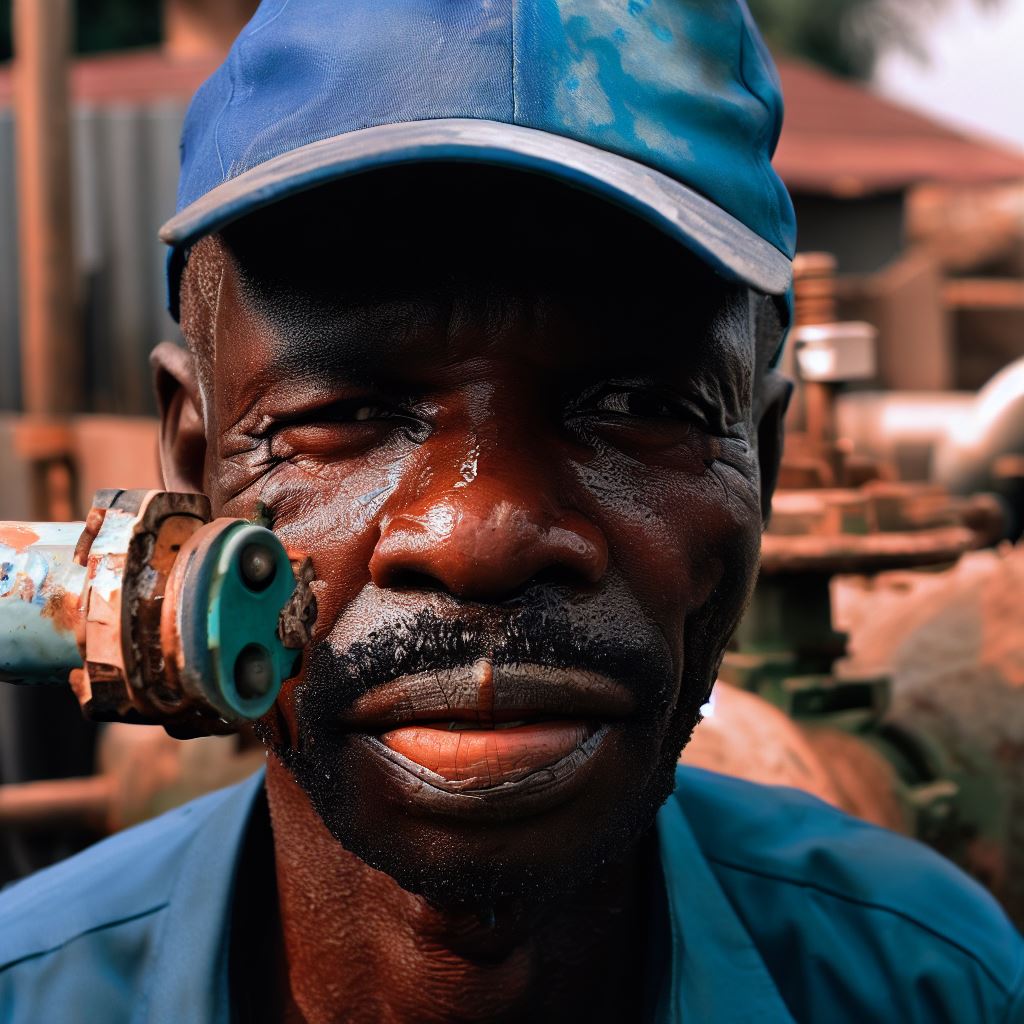Introduction
Let’s explore the role of plumbers in Nigeria’s water conservation efforts.
Water conservation is of utmost importance for sustainable development and protecting the environment.
The scarcity of water resources and the need to efficiently manage this precious commodity have become pressing global concerns.
In Nigeria, where water availability is limited, the role of plumbers in water conservation efforts cannot be overstated.
Plumbers are crucial in ensuring the efficient use of water in residential, commercial, and industrial settings.
They are skilled professionals who install and maintain plumbing systems, ensuring that they operate optimally.
Plumbers play a significant role in identifying and repairing leaks, which can result in substantial water wastage if left unattended.
Moreover, plumbers design and install water-efficient fixtures and appliances, such as low-flow toilets and faucets.
These fixtures reduce water consumption without compromising functionality.
By promoting the use of such water-saving technologies, plumbers contribute to preserving water resources and conserving energy used for water treatment and distribution.
In addition to their technical expertise, plumbers also play an educational role in promoting water conservation practices.
They can advise individuals and communities on water-saving habits, such as fixing drips promptly and using water-efficient irrigation systems.
By raising awareness and providing guidance, plumbers empower people to make conscious choices that contribute to water conservation.
In short, plumbers are integral to Nigeria’s water conservation efforts.
Their skills, knowledge, and efforts in maintaining plumbing systems, promoting water-efficient fixtures, and educating individuals are essential for ensuring sustainable water management.
The role of plumbers cannot be understated, as they contribute significantly to conserving Nigeria’s limited water resources and safeguarding the environment for future generations.
Background on Nigeria’s water situation
Overview of Nigeria’s water resources
Nigeria, located in West Africa, is home to vast water resources including rivers, lakes, and aquifers.
The country is endowed with abundant freshwater sources, making it seem like water scarcity wouldn’t be an issue.
However, Nigeria’s water situation is far from ideal.
Challenges and issues regarding water scarcity and wastage
Despite the abundance of water resources, Nigeria faces significant challenges related to water scarcity and wastage.
Rapid population growth, urbanization, and industrialization have put immense pressure on water resources, resulting in increased scarcity.
Furthermore, poor water management, inefficient infrastructure, and inadequate sanitation systems exacerbate the problem.
The combination of these challenges has led to severe consequences, affecting both rural and urban areas.
In rural communities, lack of access to clean water sources forces people to rely on contaminated water, resulting in the spread of waterborne diseases and poor hygiene practices.
Urban areas, on the other hand, experience frequent water shortages and intermittent supply due to aging infrastructure and high demand.
To address these issues and promote water conservation, plumbers in Nigeria play a crucial role.
Plumbers are trained professionals who specialize in installing, repairing, and maintaining water supply systems.
Their expertise is essential in ensuring efficient water usage and minimizing wastage.
Plumbers contribute to Nigeria’s water conservation efforts in several ways.
Firstly, they play a vital role in the installation of water-efficient fixtures and devices.
By installing low-flow faucets, toilets, and showerheads, plumbers help reduce water consumption without compromising functionality.
These water-saving devices can significantly decrease water wastage in households, commercial buildings, and public spaces.
Additionally, plumbers provide valuable guidance to individuals and communities on water conservation practices.
They educate households on proper water usage, such as turning off taps while brushing teeth or collecting and reusing rainwater for gardening purposes.
By promoting these conservation habits, plumbers raise awareness and encourage responsible water consumption habits at the grassroots level.
Plumbers also collaborate with other professionals in the water sector to develop innovative solutions.
They work alongside engineers, hydrologists, and policymakers to design and implement water conservation strategies.
By pooling their expertise and knowledge, they find sustainable ways to address Nigeria’s water challenges, ensuring a more efficient and equitable distribution of this precious resource.
In fact, Nigeria’s water situation faces numerous challenges, including scarcity and wastage.
Plumbers play a fundamental role in the country’s water conservation efforts.
Through their expertise in installing water-efficient fixtures, maintaining water distribution systems, and promoting responsible water usage, plumbers contribute significantly to conserving Nigeria’s water resources.
Their collaboration with other professionals and active involvement in water conservation projects further strengthens their impact.
With continued focus on water conservation and the dedication of plumbers, Nigeria can work towards a more sustainable and water-secure future.
Read: Plumbing Challenges in Nigeria: An In-Depth Analysis
Importance of water conservation in Nigeria
Environmental impact and concerns
Water conservation is crucial in Nigeria to address environmental issues such as water scarcity, pollution, and ecosystem degradation.
Inefficient water usage leads to depletion of water sources, causing adverse effects on plant and animal life.
Conservation efforts can help restore and maintain the delicate balance of aquatic ecosystems, preserving biodiversity.
By reducing water pollution, conservation practices also protect Nigeria’s rivers, lakes, and other water bodies from contaminants.
Economic implications
Water scarcity affects Nigeria’s economy by limiting agricultural productivity and increasing food prices.
Conservation measures can minimize water loss, ensuring sustainable water availability for irrigation and farming.
Reduced water consumption also translates into lower energy costs for pumping and treating water, benefiting industries and households.
Furthermore, water conservation initiatives create job opportunities, promoting economic growth and poverty reduction.
Public health benefits
Water conservation plays a vital role in safeguarding public health in Nigeria.
Insufficient access to clean and safe water leads to the spread of waterborne diseases such as cholera and typhoid fever.
Conserved water resources can be effectively utilized for hygiene practices, ensuring healthier living conditions for communities.
By reducing water scarcity, conservation efforts help prevent conflicts related to water access and promote peace.
Water conservation is a pressing matter in Nigeria, considering its environmental, economic, and public health implications.
The country must prioritize and implement effective strategies to address water scarcity and promote sustainable usage.
Efforts should include raising awareness, enforcing water regulations, investing in infrastructure, and promoting efficient water management practices.
Education and community engagement are key to changing behaviors and fostering a culture of water conservation.
Individuals, businesses, and the government must actively participate in conserving water resources for a better future.
By adopting water-saving technologies and practices, such as rainwater harvesting and efficient irrigation methods, Nigeria can make significant progress in water conservation.
Furthermore, collaborations with international organizations and sharing best practices can enhance Nigeria’s conservation efforts.
Water conservation is a shared responsibility, and every citizen has a role to play in preserving this vital resource.
Together, we can ensure a sustainable water supply in Nigeria, safeguarding the environment, economy, and public health.
Let us prioritize water conservation and make it a top priority for a better future.
Read: Becoming a Plumber in Nigeria: Skills and Training Needed
Duties and Responsibilities of Plumbers
Installation and Maintenance of Water-Saving Fixtures
Plumbers play a crucial role in Nigeria’s water conservation efforts by installing and maintaining water-saving fixtures.
These fixtures, such as low-flow toilets and faucets, help minimize water wastage.
Water-saving fixtures are designed to use less water without compromising functionality.
Plumbers are responsible for installing these fixtures in homes, offices, and public buildings.
They ensure that the fixtures are properly connected to the water supply and have no leaks or malfunctions.
Regular maintenance of water-saving fixtures is also part of a plumber’s duties.
They inspect and repair any issues that may arise, such as clogged pipes or faulty valves.
By ensuring the efficient operation of these fixtures, plumbers contribute to water conservation by reducing unnecessary water consumption.
Leak Detection and Repair
Another important responsibility of plumbers is leak detection and repair.
Water leaks can lead to significant water wastage, which is detrimental to conservation efforts.
Plumbers are trained to identify hidden leaks and fix them promptly. Leak detection requires specialized skills and equipment.
Plumbers use tools like leak detectors and pressure gauges to locate leaks in pipes and plumbing systems.
Once a leak is detected, they employ various techniques to repair it, such as pipe replacement or sealing with appropriate materials.
By addressing leaks, plumbers not only save water but also prevent potential damage to buildings and infrastructure.
Undetected leaks can cause structural damage over time and lead to costly repairs.
Timely leak detection and repair are essential for both water conservation and long-term maintenance.
Educating the Public on Water Conservation Practices
In addition to their technical duties, plumbers also have a role in educating the public about water conservation practices.
They can raise awareness about the importance of water conservation and provide practical tips on how to reduce water usage.
Plumbers can conduct workshops or seminars to inform individuals and communities about water-saving techniques.
They can advise on the proper use of water-saving fixtures, encourage regular maintenance, and share tips on minimizing water wastage during daily activities like bathing or washing dishes.
Publish Your Professional Profile, Business or Brand
Showcase your expertise, gain trust, and boost visibility instantly on Professions.ng.
Publish NowBy educating the public, plumbers empower individuals to make conscious choices that contribute to water conservation.
Their knowledge and guidance can create a lasting impact on people’s behavior and promote a culture of sustainable water usage.
In essence, plumbers in Nigeria have vital duties and responsibilities that directly contribute to water conservation efforts.
Through the installation and maintenance of water-saving fixtures, detection and repair of leaks, and public education on water conservation practices, plumbers play a crucial role in ensuring the sustainable use of water resources.
Their active involvement and expertise are essential for achieving long-term conservation goals and preserving this valuable natural resource.
Read: Tools of the Trade: Essential Equipment for Nigerian Plumbers

The role of plumbers in water infrastructure planning
Plumbers play a crucial role in Nigeria’s water conservation efforts.
Their expertise and knowledge are invaluable in ensuring the proper management of water resources and the development of sustainable water infrastructure.
Collaborating with engineers and policymakers
Plumbers collaborate closely with engineers and policymakers in water infrastructure planning.
Their input is essential in designing and implementing efficient systems that can conserve water while meeting the needs of the population.
By working hand in hand with engineers, plumbers can contribute their practical understanding of plumbing systems to the overall design and construction process.
They can provide insights on pipe sizing, fixture selection, and layout optimization, ensuring that the infrastructure is not only functional but also water-efficient.
This collaboration also extends to policymakers who shape water resource management policies.
Plumbers can offer valuable recommendations based on their on-the-ground experience, helping policymakers make informed decisions regarding water conservation measures and infrastructure investments.
Providing expert advice on water conservation measures
Plumbers are well-versed in the various water conservation measures that can be implemented in both residential and commercial settings.
Their expertise enables them to recommend and implement practical solutions that can significantly reduce water wastage.
One of the key areas where plumbers can provide expert advice is in the installation and maintenance of water-efficient fixtures such as low-flow toilets, faucets, and showerheads.
These fixtures can save substantial amounts of water without compromising the comfort and convenience of users.
Additionally, plumbers can help identify and fix leaks and other plumbing issues that contribute to water wastage.
Through regular inspections and maintenance, they can ensure that the plumbing system is functioning optimally, preventing any unnecessary water loss.
Education also plays a crucial role in water conservation, and plumbers can take on the role of educators.
They can provide homeowners and businesses with tips on water-saving practices and educate them on the importance of responsible water usage.
This knowledge empowers individuals to adopt water conservation measures in their daily lives, contributing to the overall conservation efforts.
Ensuring sustainable water management practices
Plumbers are instrumental in ensuring sustainable water management practices, which are essential for the long-term availability of water resources.
Their role extends beyond the construction phase and encompasses ongoing maintenance and repair activities.
Regular maintenance of plumbing systems by plumbers helps identify and address potential issues before they become major problems.
By promptly fixing leaks, replacing worn-out components, and optimizing system operations, plumbers contribute to conserving water and extending the lifespan of water infrastructure.
Plumbers can also advocate for the use of environmentally friendly materials and technologies.
For example, they can recommend the use of recycled water systems, rainwater harvesting systems, and water-efficient appliances.
These sustainable practices help reduce the strain on freshwater sources and promote the responsible use of water resources.
In general, plumbers play a vital role in Nigeria’s water conservation efforts.
By collaborating with engineers and policymakers, providing expert advice on water conservation measures, and ensuring sustainable water management practices, they contribute to the development of efficient and resilient water infrastructure.
Their expertise is essential in promoting responsible water usage and preserving water resources for future generations.
Read: Top Plumbing Schools in Nigeria: A Guide for Aspiring Plumbers
Explore Further: Salaries of HR Specialists in Nigeria: A Guide
Challenges faced by plumbers in Nigeria’s water conservation efforts
Lack of awareness and support from the public
Many Nigerians are not aware of the importance of water conservation. There is a lack of education and information about water conservation practices.
The public does not understand the role plumbers play in water conservation efforts.
Without public awareness and support, plumbers face difficulties in promoting water conservation.
Limited availability of funds and resources
Plumbers in Nigeria often face financial constraints when implementing water conservation measures.
There is a lack of funding from the government and other organizations for water conservation projects.
Without adequate resources, plumbers struggle to carry out their work effectively.
The limited availability of tools and equipment hinders their ability to address water conservation issues.
Outdated plumbing infrastructure
Many buildings in Nigeria have outdated plumbing systems that are not designed for water conservation.
Old pipes and fixtures contribute to water wastage and leaks.
Plumbers face challenges in retrofitting these buildings with modern, water-efficient plumbing systems.
Outdated infrastructure requires additional time and effort from plumbers to ensure effective water conservation.
Case studies of successful water conservation projects involving plumbers
Description of a specific project and its impact
One successful water conservation project in Nigeria involved the collaboration of plumbers, government bodies, and local communities.
The project aimed to address the issue of water scarcity and improve access to clean water in a rural village.
The plumbers played a crucial role in this project by assessing and repairing the existing water infrastructure.
They identified leaks, replaced old pipes, and installed water-saving fixtures such as low-flow toilets and faucets.
As a result, the village experienced a significant decrease in water wastage.
The repaired infrastructure ensured a reliable water supply, particularly during dry seasons when water scarcity was a major issue.
The impact of this project extended beyond water conservation.
With improved access to clean water, the health and sanitation conditions in the village also improved.
The risk of waterborne diseases decreased, leading to a healthier population.
Analysis of the role of plumbers in the project’s success
The role of plumbers in this water conservation project was fundamental to its success.
Their expertise in identifying and fixing leaks and repairing infrastructural issues contributed directly to water conservation efforts.
By using their knowledge of plumbing systems, the plumbers were able to design and implement effective solutions.
Their work ensured the efficient distribution of water, minimizing wastage and maximizing its utilization.
This was crucial in a region where water scarcity was a pressing issue.
Additionally, the plumbers’ involvement facilitated community engagement and education.
They interacted with the local community, raising awareness about the importance of water conservation and providing advice on water-saving practices.
The success of the project also relied on the plumbers’ ability to adapt to local conditions.
They considered factors such as the availability of materials, local water usage patterns, and the community’s needs when implementing solutions.
Lessons learned and future possibilities
This case study highlights the significant impact plumbers can have in water conservation projects.
It emphasizes the importance of recognizing the expertise and contribution of plumbers in such endeavors.
Lessons learned from this project include the need for collaboration between plumbers, government bodies, and local communities.
Engaging all stakeholders ensures the success and sustainability of water conservation initiatives.
Furthermore, this case study opens up possibilities for scaling up similar projects across Nigeria.
By replicating successful models and adapting them to different regions’ contexts, more communities can benefit from improved water conservation efforts.
The involvement of plumbers in water conservation efforts should also be integrated into policies and regulations.
Recognizing their role can lead to increased support for training programs and professional development opportunities.
In review, plumbers play a crucial role in Nigeria’s water conservation efforts.
Through their skills, expertise, and active involvement, they contribute significantly to addressing the issue of water scarcity and improving access to clean water in communities across the country.
Conclusion
Throughout this blog section, we have highlighted the crucial role that plumbers play in Nigeria’s water conservation initiatives.
They are instrumental in maintaining and repairing water distribution systems, as well as implementing water-saving fixtures and technologies.
Plumbers are unsung heroes when it comes to water conservation.
Their expertise and dedication ensure that precious water resources are utilized efficiently, preventing wastage and promoting sustainable practices.
It is crucial for individuals, communities, and government bodies to recognize and support the efforts of plumbers in water conservation.
By providing them with resources, training, and appreciation, we can strengthen their impact and create a more sustainable future for Nigeria.
Let us join hands to raise awareness about the vital role plumbers play in water conservation.
Together, we can make a difference and ensure that Nigeria’s water resources are preserved for generations to come.




